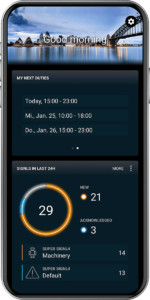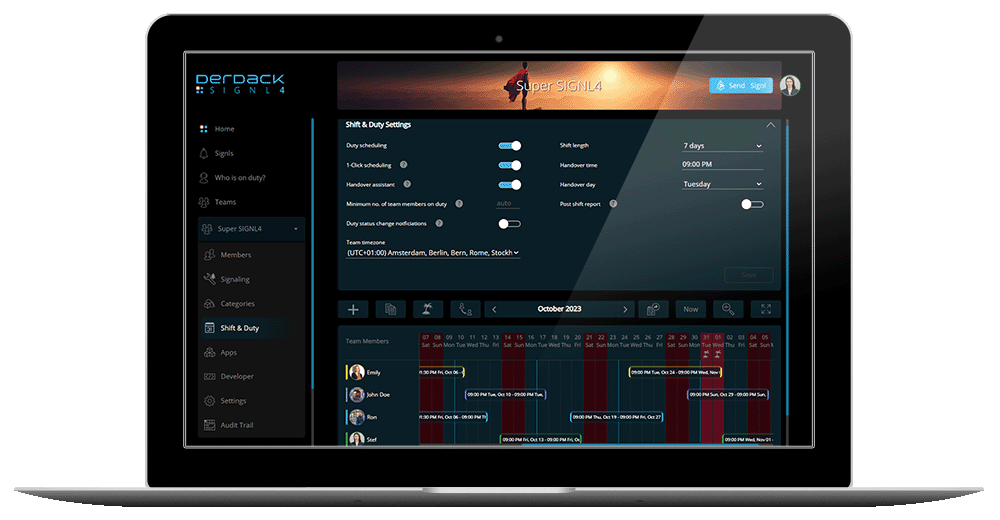Having your systems monitored by a reliable solution is important, but how do you ensure that the right people are informed about issues that arise? Identifying problems is the first step, but they also need to be routed to the appropriate individuals. Keep in mind that employees may not always be sitting in front of the dashboard. This means being available outside of normal working hours to quickly respond to emergencies and problems, including not only weeknights but also weekends and holidays. For IT staff in particular, being on-call is often very common. It is a crucial part of the job as they must be available outside of normal working hours to quickly respond to emergencies and problems. In this article, we will examine the importance of proper on-call planning and offer suggestions on how companies can effectively manage this aspect of their IT operations.
Proper weekend on-call scheduling can bring numerous benefits to a company. These include:
More efficient operations: By having the right personnel available during critical times, emergencies and issues can be addressed promptly. This helps minimize disruptions to the business and keep operations running smoothly.
Higher employee satisfaction: By distributing on-call responsibilities more evenly, employees are less likely to feel overworked. This helps to ensure that no single employee is shouldering a disproportionate share of the workload, leading to a more engaged, motivated and productive workforce.
Reduced expenses: By avoiding unnecessary call-outs, companies can save on costs like the need for overtime pay or the costs associated with resolving problems that could have been prevented with proper planning.
Improved customer satisfaction: Quicker resolution of issues leads to happier customers. By ensuring that problems are identified and resolved promptly, companies can maintain customer satisfaction, build trust, and foster long-term relationships.
Increased safety: By ensuring an efficient response in emergency situations, the safety of both the company and its employees is increased. This can include reducing the risk of injuries, protecting company assets, and ensuring that emergency situations are handled quickly and effectively.
Enhanced compliance: Adequate on-call planning helps companies comply with legal and regulatory requirements. This includes meeting the requirements of relevant industry standards, as well as ensuring that emergency response plans are in place and that they meet the needs of the company, its employees, and its customers.
Streamline your on-call duties with the right solution
Utilizing alerting software like SIGNL4 can greatly improve on-call scheduling, particularly during non-business hours. With features such as direct mobile alerts, incident response coordination and scheduling management, SIGNL4 facilitates swift and effective communication among team members. This allows for prompt resolution of issues and ensures that someone is always available for emergency response.
SIGNL4 allows you to easily notify employees of incidents through various channels such as mobile push, SMS, or phone call. With the option to override the do-not-disturb mode for app push, you can ensure that your employees receive the alerts regardless of their device settings. Notification settings can be configured individually for each employee within the app or web browser.
The SaaS solution also makes it simple to plan and manage on-call duties with the ability to schedule on-call settings, duties, and shifts using the web browser. Additionally, existing APIs can be used to import duty rosters from other tools such as SAP, and export them for accounting purposes.
SIGNL4 also reminds employees before their shift starts, and they can check their duty status at any time via the mobile app with internet connection. The “Who’s on duty” dashboard provides real-time information. You can get all details regarding on-call duty and scheduling here.
With SIGNL4, responsibilities can be pre-defined to ensure that employees are alerted of incidents in their specific areas. For more information on how to optimize alerts, read our blog post on category-based alerting. If an employee does not respond to the alert, it is escalated to the next person in line, according to the individually set notification settings. The escalation chain can include up to three teams and end with the responsible manager, ensuring that the problem is acknowledged and can be resolved quickly.
Summary
Being on-call during the weekend can be a significant challenge for companies and employees. However, proper on-call scheduling can improve operations, increase employee satisfaction and boost company success. By implementing a well-designed on-call policy, rotating on-call time, preparing employees, providing rewards, and encouraging employee feedback, on-call can be made more manageable and successful for all parties involved. SIGNL4 can aid in on-call management by facilitating fast and effective communication and collaboration, setting up automated workflows, tracking and logging previous on-call events and supporting employee mobility. To experience the benefits of SIGNL4 for yourself, sign up for our free 30-day trial. Our tutorial will guide you through the initial steps of creating a relaxed on-call plan and ensuring that the responsible employees receive alerts.




